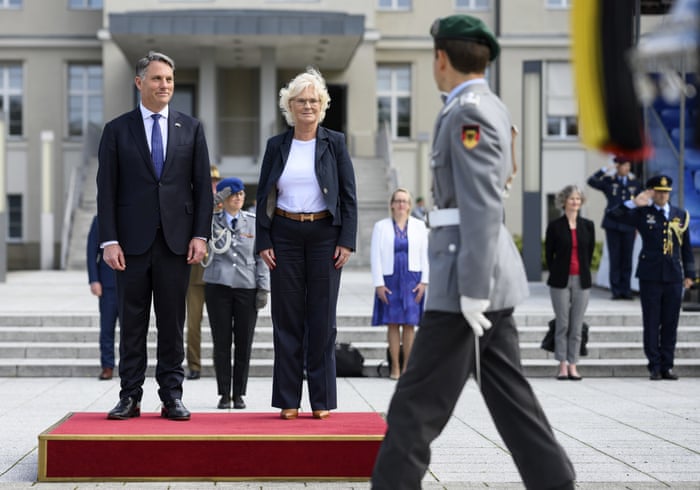
What we learned, Tuesday 30 August
And with that we are going to put the blog to bed – thank you for spending the day with us.
Before we go, let’s go though the big headlines:
We will be back tomorrow to do it all again – thank you for spending the day with us.
Key events
Bottlenose dolphins know how to be team players, research shows
From AAP:
Bottlenose dolphins are the best team players in the animal kingdom, second only to humans, a study shows.
Males are able to form complex alliances and interact in a social network, which leads to greater access to females and reproduction.
“There’s another incredible society outside of our own,” study co-author Dr Simon Allen of the University of Western Australia (UWA) and University of Bristol told AAP.
“It’s the biggest social network that we know of outside of humans in terms of big large-brained animals that all kind of know each other.”
“(They) have friends, friends of friends and foes that they’re all familiar with.”
The dolphin study was a joint project between scientists from UWA, University of Bristol, University of NSW and the University of Massachusetts.
Far-right extremism in Victoria stoked by pandemic, report finds
From AAP:
Neo-nazism and other far-right extremist ideologies are a growing threat in Victoria and are putting marginalised groups at risk of violence, a new report says.
In the 150-page report tabled in state parliament on Tuesday, the Legal and Social Issues Committee delved into the rise of far-right extremism within Victoria.
It found declining mental health, social isolation and economic insecurity brought on by the Covid-19 pandemic has stoked far-right extremism.
Misinformation, conspiracy theories peddled on social media and the normalisation of anti-immigration rhetoric in mainstream media have also put vulnerable people at risk of radicalisation and made them more susceptible to racist narratives, it said.
Multicultural groups, women and LGBTQ+ members were identified as common targets of far-right extremists.
The Greens-initiated inquiry was prompted by a neo-Nazi gathering in the Grampians in January 2021 and the erection of gallows outside parliament as MPs debated pandemic legislation in November.
Tory Shepherd
Pacific tensions simmer amid Richard Marles and Penny Wong tours
Tensions between Australia, the United States, the Indo Pacific, and China are still simmering as defence minister Richard Marles and foreign affairs minister Penny Wong continue their respective overseas tours.
After two days in Papua New Guinea, during which Wong said Australia’s support for the region came with “no strings attached” (implying that Chinese support came with strings), Wong is set to arrive in Timor-Leste tomorrow.
There, one of the subjects up for discussion is a gas pipeline that Timor-Leste would like to pipe resources into their country, rather than into Darwin.
President José Ramos-Horta has said he will turn to China for support if he has to.
Wong’s message for the Indo Pacific region has been that the new government is listening, is helping to finance infrastructure, and will continue to support economic development.
Marles is in Europe. While in Germany he said the “world is under a lot of pressure right now”, as he welcomed Germany’s interest in the Indo Pacific.
He will also travel to the United Kingdom (which is a contender to provide a new nuclear-powered submarine fleet) and France (which, along with Australia, is also stepping up its commitments in the Indo Pacific).

Germany announced today that it will participate in Exercise Talisman Sabre next year. That pledging of forces is a sign of Germany’s concern about what’s happening in the region. Marles said:
“Now is a time where friends need to stand together, and Australia and Germany have shared beliefs. We’re both democracies. We both support a global rules-based order.”
References to the global rules-based order refer to those who do not respect it, such as China and Russia.
Meanwhile, the Herald Sun reports that Marles has said Australia needs to urgently acquire hypersonic missiles, which can fly at many times the speed of sound. Marles said:
“Hypersonics are really important for the future and I think there is an urgency about acquiring and developing (the capability).”
This afternoon the ABC reported that Solomon Islands, which has entered security agreements with China, put a moratorium on US navy vessels entering its ports.

Amanda Meade
The Teacher’s Pet podcast, which has been inextricably linked with the murder trial of Christopher Michael Dawson, won the highest accolade in Australian journalism for Hedley Thomas and Slade Gibson and has been downloaded 60m times internationally.
Adam Bandt asked the Parliamentary Budget Office to crunch some numbers around the distribution of the stage-three tax cuts. Here’s one thing the PBO found:

Paul Karp
Albanese also endorsed a proposal for Papua New Guinea to compete in the NRL.
Albanese said:
Well, it’s something that I think is a pretty good idea. I’ve got to say I was at the Pacific Island forum meeting including with prime minister [James] Marape and other leaders in Tonga and Samara and Fiji the Pacific. And Papua New Guinea in particular is so passionate about rugby league.
That it is something I’ve raised with the NRL with Peter V’Landys. And I think that has a great deal of merit, if you have a look at the rugby league lists, there’s a few players there with Pacific and PNG background. And I think that anything that improves our relations in the region sport can play a role in.
It certainly would be in my view in the national interest, and in the view of good relations in our region.
‘Lynette’s journey is not complete. She’s still missing’: Lynette Dawson’s brother
Outside court, Lynette Dawson’s brother called on Chris Dawson to reveal where her body is, 40 years after her murder.
Greg Simms said:
Lynette’s journey is not complete.
She’s still missing. We still need to bring her home.
We would ask Chris to find it in himself, to allow us to bring her home for peaceful rest – finally showing some dignity she deserves.

Paul Karp
PM defends decision not to scrap stage-three tax cuts
Anthony Albanese is on ABC Sydney, again on the defensive about why Labor hasn’t reversed its position and decided to tear up the stage-three tax cuts.
Albanese said:
We tried to amend the legislation, we weren’t successful, by one vote. All the crossbench in the Senate voted for stage three. That was a legislated change, we had to make a decision once we weren’t successful whether to block all the tax cuts for everyone. We didn’t do that.
We said at the time it was ambitious to say you know what the economy would look like in 2024. There is also the issue of certainty that is there, these are legislated tax cuts … and we did say we wouldn’t seek to change them, at the election.
Albanese also claims the stage-three tax cuts discussion “wasn’t front and centre” in the election campaign, and that Adam Bandt had a chance to advocate then. Which is odd because: (1) the Greens definitely did advocate this then; and (2) to the extent they weren’t front and centre, it was because Labor promised not to tear them up.
Albanese said Labor will examine jobseeker payments “each and every year”, citing the fact Labor passed the biggest increase in the pension “in history” in its last year in office (2013). “Labor will always be better on these issues,” he said, although jobseeker won’t be raised in the October “mini-budget”.
Over social media, people are reacting to Chris Dawson’s guilty verdict:
Actually, now I’m sobbing. For Lynette, for everything she endured as a loving mother, and for the fact that Chris Dawson got away with it for so long. The world is changing, yes, and thank goodness for that. For all our sakes – but for our daughters most of all #dawson #guilty
— Nikki Gemmell (@NikkiGemmell) August 30, 2022
The verdict appears to have come down to Dawson’s lies demonstrating an evidence of a consciousness of guilt.
— Samantha Lock (@Samantha__Lock) August 30, 2022
These lies were, as cited by Justice Harrison:
– Travelling to Queensland by himself at Christmas
– His relationship with JC
– His desire for Lyn to come home
– Receiving phone calls from Lyn and bankcard statements that indicated she was still alive— Samantha Lock (@Samantha__Lock) August 30, 2022
So unjustifiably sad that he was a free man for 40 years and his crimes virtually nullified. May Lynette’s family find peace in the knowledge that this coward is finally brought to his knees.
— Kristy Renae (@KristyRenae1) August 30, 2022
Nino is outside the courtroom still and will bring us an update soon.
Chris Dawson’s lawyer suggests client will appeal guilty verdict

Nino Bucci
Speaking outside court, Christopher Dawson’s lawyer Greg Walsh suggested his client would appeal Tuesday’s verdict.
He said:
Mr Dawson has always asserted, and he still does, his absolute innocence of the crime of which he’s been convicted. He’ll continue to assert that innocence and he’ll certainly appeal.
Family and friends of Lynette Dawson, along with supporters of Dawson, including his lawyer and twin brother Paul Dawson, have left court following this afternoon’s verdict.
Walsh, who left the court at the same time as Lynette Dawson’s family were speaking on the steps of the court, said his client was in shock and upset.
He said he did not believe Dawson had said anything to him in court immediately after the verdict was handed down.
Walsh said that when Justice Ian Harrison mentioned relatively early in his verdict that he was convinced beyond reasonable doubt that Lynette Dawson had died on 8 January 1982 – as the prosecution had alleged – he felt that conviction was “on the cards”.
Walsh said Dawson did not discuss with him whether he felt he had a fair trial. But the lawyer wanted to make clear it was concerning that Harrison had not addressed questions about a missing police homicide-squad file into Lynette Dawson’s disappearance, which may have assisted his client. This could have included information about financial transactions.
He said:
The whole file is gone. How can Mr Dawson rely upon that evidence if it just disappears?
Walsh said it was clear serious miscarriages of justice had occurred in the past, such as in the Chamberlain case, and Dawson maintained his innocence.
He said Dawson’s daughters would “stay strong”, but also wanted to make clear that the “disappearance” of Lynette was a “very sad fact” and it was “in some respects an important day” for her family.
Dawson would find custody difficult, Walsh said, as he had been diagnosed with dementia that may be linked to his history playing rugby league. He said:
Jail will be much harder for him, he’s got real cognitive problems, and he’s got problems with his hips and his knees etc.
Dawson is expected to apply for bail on Thursday.
From Reuters:
The Solomon Islands government has told the US it will place a moratorium on navy vessels entering its ports, the US embassy in Canberra said on Tuesday.
The notice follows an incident last Tuesday when a US Coast Guard vessel, the Oliver Henry, was unable to enter Solomon Islands for a routine port call because the government did not respond to a request for it to refuel and provision.
The Solomon Islands has had a tense relationship with the US and its allies since striking a security pact with China earlier this year.
“On Aug. 29, the United States received formal notification from the government of Solomon Islands regarding a moratorium on all naval visits, pending updates in protocol procedures,” the embassy said in today’s statement.
A spokesman for Solomon Islands prime minister Manasseh Sogavare earlier denied the reports of a moratorium, and told Reuters that Sogavare would make a speech on Tuesday afternoon.
Sogavare would make a speech to welcome a US navy hospital ship, Mercy, which arrived in Honiara on Monday for a two-week mission, he said.
The embassy said Mercy had arrived before the moratorium.

Peter Hannam
With the earnings season all but over, we’ve had one of the last major companies reporting, Woodside Energy.
Needless to say, the company reported a big jump in earnings. Soaring energy prices have propelled profits skyward for most energy companies, with Woodside’s five-fold rise just the latest.
After similar results for Santos, Whitehaven Coal and other fossil-fuel exporters, calls for a windfall tax have been renewed, as we report here:
Woodside’s share price was up about 1.7% in late trade, or about triple the increase in the wider ASX 200 benchmark index.
The Albanese government has so far not given any hint that it is planning another effort to rake back some of those bumper earnings. NSW, too, shows no interest in following Queensland’s example in changing its royalties regimes.
See our report from June:
Instead, any effort in this space is likely to focus on questions around multinational tax. Are companies paying all that they should be (rather than, say, using so-called transfer pricing to book profits in low-taxing states such as Singapore)?
The longer energy prices stay high, though, demands for some redistribution effort won’t go away.
From AAP:
Laws to put in place a national corruption watchdog will be brought to federal parliament in two weeks.
It is understood the Labor caucus will be asked to approve the bill on September 13 before it is introduced to the lower house.
The Morrison government had flagged the formation of a Commonwealth Integrity Commission, but did not bring its bill to parliament.
The National Anti-Corruption Commission (NACC), as Labor’s model will be known, will have a broad jurisdiction to investigate commonwealth ministers, public servants, statutory office holders, government agencies, parliamentarians, and the personal staff of politicians.
From AAP:
Australia’s medical regulators have given a green light for a COVID vaccine that will target the Omicron variant.
The Therapeutic Goods Administration granted provisional approval to Moderna’s bivalent COVID vaccine, the first of its type in Australia.
The bivalent vaccine will be able to trigger an immune response against the original COVID variant and the Omicron strain.
The vaccine has been approved for use as a booster among those over 18 and can be given at least three months after the initial two doses or previous booster.
Final approval for the new vaccine will still need to be granted by the Australian Technical Advisory Group on Immunisation.
From AAP:
Australia’s leading scientific organisation has called for a boost to virus research and vaccine manufacturing capabilities in a bid to future-proof the country from pandemics.
In a new report, the CSIRO outlined 20 recommendations to strengthen Australia’s pandemic preparedness, following on from the experiences of COVID-19.
Among the recommendations were to improve research into five virus families that have the greatest potential to become future pandemics.
Scientists also identified a need to diversify the types of vaccines made in Australia to be better prepared.
“The absence of manufacturing capabilities across diverse vaccine technologies reduces Australia’s capability to produce vaccines onshore for an emergent viral threat,” the report said.
“Australian companies face barriers, such as high input costs and small population for clinical trial enrolments.”

Graham Readfearn
All the signs are pointing to another wet summer, with the Bureau of Meteorology’s latest update suggesting a good chance of a return of the La Niña that has helped drench the east of the continent for the last two years.
Back in June, scientists warned a rare “triple-dip La Niña“ could be on the cards. Earlier this month, the bureau issued a “La Niña alert” saying the chance of the system returning was on the up.
Today, the bureau said the chance had risen further, with four of seven climate models showing the La Niña conditions could return by early-to-mid spring. The other three models suggest a neutral but cooler than average outlook.
In a La Niña, trade winds strengthen and push warmer surface water closer to Australia, promoting clouds and rain.
In Australia, the bureau says La Niña events increase the chance of above-average rainfall for northern and eastern Australia during spring and summer.
La Niña has opposite impacts elsewhere, with the system blamed for worsening drought in North America and East Africa.


